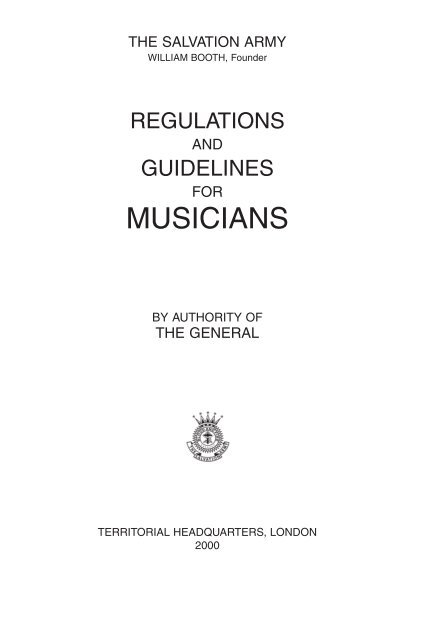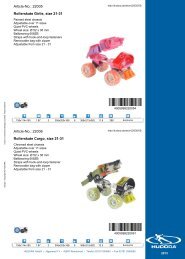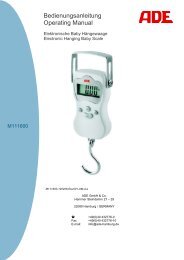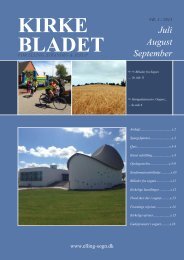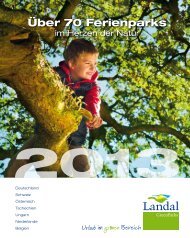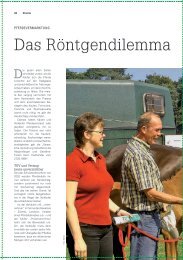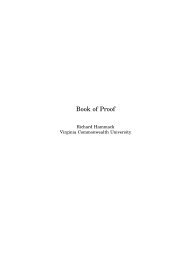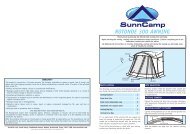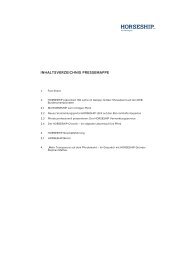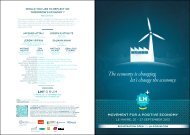Regulations and Guidelines for Musicians
Regulations and Guidelines for Musicians
Regulations and Guidelines for Musicians
Create successful ePaper yourself
Turn your PDF publications into a flip-book with our unique Google optimized e-Paper software.
THE SALVATION ARMY<br />
WILLIAM BOOTH, Founder<br />
REGULATIONS<br />
AND<br />
GUIDELINES<br />
FOR<br />
MUSICIANS<br />
BY AUTHORITY OF<br />
THE GENERAL<br />
TERRITORIAL HEADQUARTERS, LONDON<br />
2000
Abbreviations used in this book<br />
CO = comm<strong>and</strong>ing officer<br />
DC = divisional comm<strong>and</strong>er<br />
DDFP = divisional director <strong>for</strong> field programme<br />
DHQ = divisional headquarters<br />
MMO = music ministries officer<br />
MMU = music ministries unit<br />
O & R = orders <strong>and</strong> regulations<br />
SA = The Salvation Army<br />
SAGIC = The Salvation Army General Insurance<br />
Corporation Ltd<br />
THQ = Territorial Headquarters<br />
UK Territory/UKT = United Kingdom Territory with the Republic<br />
of Irel<strong>and</strong><br />
YP = young people, or young people’s<br />
YPBL = young people’s b<strong>and</strong> leader<br />
YPSCL = young people’s singing company leader<br />
YPSM = young people’s sergeant major<br />
Note: In these guidelines the word ‘man’, ‘he’, ‘his’ or ‘him’ must be<br />
understood to refer to persons of either sex, unless otherwise indicated<br />
or obviously impossible.
CONTENTS<br />
Chapter Page<br />
I Principles <strong>and</strong> Responsibilities<br />
Sect 1. Aims <strong>and</strong> Objectives 5<br />
2. Territorial/Divisional Programme Responsibility 6<br />
II Officially Recognised Music Sections/Groups<br />
(Instrumental <strong>and</strong> Vocal)<br />
Sect 1. General Provisions 8<br />
2. Membership of Corps Music Sections/Groups 8<br />
3. Corps Leadership Structure 14<br />
4. Leadership Responsibilities 15<br />
5. Programme of Activities 18<br />
III Finance <strong>and</strong> Property<br />
Sect 1. Finance 23<br />
2. Property 26<br />
IV Legal Matters 29<br />
V Junior Music Sections/Groups<br />
Sect 1. Membership 33<br />
2. Leadership – Junior Music Section/Group Leaders 35<br />
3. Other Groups 36<br />
VI Divisional B<strong>and</strong>master/Songster Leader 37<br />
VII <strong>Guidelines</strong> <strong>for</strong> Other Salvation Army Music Groups<br />
Sect 1. Praise <strong>and</strong> Worship Groups/Choirs, Gospel Choirs, etc 40<br />
2. Territorial/Divisional Youth B<strong>and</strong>s <strong>and</strong> Choirs 42<br />
3. Fellowship B<strong>and</strong>s/Choirs, etc 44<br />
4. Other Open Groups 47
MISSION STATEMENT FOR<br />
ALL MUSICIANS IN THE<br />
SALVATION ARMY<br />
To bring glory to God <strong>and</strong> to<br />
make him known
CHAPTER I<br />
PRINCIPLES AND RESPONSIBILITIES<br />
SECTION 1. AIMS AND OBJECTIVES<br />
1. Supreme Aim<br />
The aim of all music making is to proclaim the gospel <strong>and</strong> help to accomplish<br />
The Salvation Army’s mission.<br />
2. Salvationism<br />
Salvationists have a primary commitment to the Christian life <strong>and</strong> to Salvation<br />
Army principles <strong>and</strong> regard their musical service as part of their total offering<br />
to God.<br />
3. Relationships to Corps<br />
<strong>Musicians</strong> will be supportive to their total corps/centre programme, often<br />
seeking to be involved in other aspects of its ministry. They will co-operate<br />
with their corps/centre leaders to maintain a totally integrated corps/centre<br />
programme.<br />
4. <strong>Musicians</strong>hip <strong>and</strong> Spiritual Power<br />
Belief in the value of music as a vehicle <strong>for</strong> worship <strong>and</strong> communication will<br />
require a commitment to the highest possible st<strong>and</strong>ards, while ensuring that<br />
per<strong>for</strong>mance never becomes an end in itself.<br />
5. To be of Service<br />
All music sections/groups have a special responsibility:<br />
a) To engage in outreach activity of all kinds.<br />
b) To aid worship by:<br />
i. Sensitively supporting/accompanying congregational singing<br />
<strong>and</strong> assisting in the teaching of new songs <strong>and</strong> choruses in cooperation<br />
with the meeting/worship leader.<br />
5
ii. Contributing music which will enhance the spiritual purposes of<br />
the meeting/occasion.<br />
SECTION 2. TERRITORIAL/DIVISIONAL PROGRAMME<br />
RESPONSIBILITY<br />
1. The Music Ministries Unit is a part of the Evangelism Department of THQ.<br />
The unit will be led by the Music Ministries Officer, who will be supported by<br />
the Territorial B<strong>and</strong>master, the Head of Music Editorial Section <strong>and</strong> other<br />
members of staff as required.<br />
The unit’s responsibilities will include:<br />
a) Steering of musical mission within the territory.<br />
b) Administration matters.<br />
c) Training <strong>and</strong> resources.<br />
d) The organisation of events: seminars, musicians’ councils, music<br />
festivals, etc.<br />
e) Territorial music schools in co-operation with the Youth Ministries<br />
Unit.<br />
f) Publishing of music.<br />
g) Supervision of Salvation Army recordings (see Chapter IV).<br />
h) Oversight of legal requirements – eg copyright, CCL licences, etc (see<br />
Chapter IV).<br />
i) Supervision of the Territorial Music Council.<br />
j) Resourcing the territory’s musical contribution to worship.<br />
2. Divisional Headquarters<br />
Divisional support may come in a variety of ways:<br />
a) The Divisional Comm<strong>and</strong>er with the Divisional Director <strong>for</strong> Field<br />
Programme, working in collaboration with the Music Ministries Unit,<br />
is responsible <strong>for</strong> all musical activity in the division.<br />
6
) In some divisions THQ may appoint a Regional Music Director, who<br />
will be responsible to the Music Ministries Officer <strong>and</strong> Divisional<br />
Comm<strong>and</strong>er, or delegated director, <strong>for</strong> the music programme of the<br />
division.<br />
c) In other divisions music leaders may be appointed who, whilst not<br />
employed, will give their time <strong>for</strong> the development of the division’s<br />
music programme.<br />
3. Comm<strong>and</strong>ing Officer<br />
The CO is responsible to the DC with the DDFP <strong>for</strong> overseeing all music<br />
sections/groups within the corps.<br />
7
CHAPTER II<br />
OFFICIALLY RECOGNISED MUSIC SECTIONS/GROUPS<br />
(Instrumental <strong>and</strong> Vocal)<br />
SECTION 1. GENERAL PROVISIONS<br />
1. Definition<br />
Officially recognised music sections/groups will be made up of Salvationist<br />
commissioned musicians who work together in accordance with regulations.<br />
These may include, <strong>for</strong> example, a senior b<strong>and</strong>, songsters, young people’s<br />
b<strong>and</strong>, young people’s singing company <strong>and</strong> junior/senior timbrel groups.<br />
2. No Payment to <strong>Musicians</strong><br />
Salvationist musicians shall not, in any circumstances, receive remuneration<br />
<strong>for</strong> their service within a corps/centre setting (see Chapter III, Section 1.15).<br />
3. No Voting<br />
In the management of a music section/group, while consensus may be taken in<br />
order to determine general attitude on various section/group concerns, nothing<br />
in the nature of voting is permitted. The leader is responsible to see that this<br />
order is observed.<br />
SECTION 2. MEMBERSHIP OF CORPS MUSIC<br />
SECTIONS/GROUPS<br />
1. Membership<br />
All commissioned musicians must:<br />
a) Be soldiers of The Salvation Army.<br />
b) Undertake their responsibilities as members of the group with<br />
integrity, having a clear underst<strong>and</strong>ing of current regulations <strong>and</strong> a<br />
respect <strong>for</strong> the position <strong>and</strong> authority of their section leader.<br />
8
c) Be committed to regular financial support of their corps through the<br />
systematic giving scheme.<br />
d) Accept the responsibility of subscription to sectional funds, thereby<br />
sustaining the ongoing ministry of the section.<br />
e) Regularly attend rehearsals <strong>and</strong> sectional activities, in<strong>for</strong>ming of<br />
absence when unable to attend.<br />
f) Con<strong>for</strong>m to the required uni<strong>for</strong>m code applicable with the corps<br />
(which will in turn operate under territorial guidelines as issued from<br />
time to time).<br />
g) Be prepared to speak, sing, play or pray as opportunity arises.<br />
h) Young people who have already been commissioned as musicians in<br />
junior music sections/groups may be commissioned in senior music<br />
sections/groups at any time subsequent to their becoming senior<br />
soldiers.<br />
2. Stewardship<br />
Salvationist musicians regard their time, talents <strong>and</strong> possessions as gifts to be<br />
held in stewardship to God <strong>and</strong> there<strong>for</strong>e utilise unselfishly these gifts of mind,<br />
body, spirit <strong>and</strong> environment <strong>for</strong> the advancement of Christ’s Kingdom.<br />
a) This supreme loyalty determines what a musician reads, listens to, sees<br />
<strong>and</strong> shares both in public <strong>and</strong> in private.<br />
b) This sense of responsibility leads musicians to refrain from all actions<br />
which are likely to discourage others in their Christian walk.<br />
c) The acceptance of these principles should ensure that musicians set an<br />
example by not participating in activities which might lower the moral<br />
tone of society.<br />
3. Uni<strong>for</strong>ms <strong>for</strong> B<strong>and</strong>smen <strong>and</strong> Songsters<br />
a) B<strong>and</strong>smen <strong>and</strong> songsters will be required to wear the uni<strong>for</strong>m of the<br />
section to which they belong.<br />
b) The uni<strong>for</strong>m <strong>for</strong> b<strong>and</strong>smen <strong>and</strong> songsters includes:<br />
i. Navy blue jacket <strong>and</strong> trousers (men) or skirt (women).<br />
ii. White shirt (men) or blouse (women).<br />
9
iii. Official uni<strong>for</strong>m tie (men) or brooch (women).<br />
iv. Black shoes <strong>and</strong> socks (men) or stockings/tights (women).<br />
v. Regulation cap (men) or hat (women), to be worn outdoors. The<br />
wearing of women’s hats in meetings is optional <strong>and</strong> will be<br />
decided by music section/group leaders, in consultation with<br />
COs (see Official Minute 98/2).<br />
c) Trimmings will include a white ‘S’ on the lapel. Epaulettes will be<br />
black, blue or red <strong>and</strong> the name of the corps will be included. It is<br />
recommended that all trimmings be relatively simple in <strong>for</strong>mat <strong>for</strong> ease<br />
of those who transfer to another corps.<br />
d) An optional red jacket, with a white ‘S’ on the lapel, is permissible <strong>for</strong><br />
use in festivals <strong>and</strong> on other special occasions.<br />
e) Summer uni<strong>for</strong>ms are an option (see Official Minute 90/33).<br />
f) A b<strong>and</strong>master or songster leader shall be distinguished by two rows of<br />
white (b<strong>and</strong>master) or blue (songster leader) piping at the base of the<br />
epaulette. A cap shall be distinguished by a silver badge <strong>and</strong> a white<br />
(b<strong>and</strong>master) or blue (songster leader) chin strap.<br />
g) A deputy b<strong>and</strong>master or deputy songster leader shall be distinguished<br />
by a silver cap badge. He or she should wear one row of white or blue<br />
piping respectively at the base of the epaulette <strong>and</strong> a white or blue<br />
button respectively on the epaulette.<br />
h) A sergeant shall wear a row of red piping on the base of the epaulette.<br />
i) A secretary shall wear a row of yellow piping at the base of the<br />
epaulette.<br />
j) A colour sergeant shall wear sergeant’s stripes with ‘crossed flags’<br />
above them.<br />
k) All b<strong>and</strong>smen <strong>and</strong> songsters must purchase their own uni<strong>for</strong>m<br />
clothing.<br />
4. Young People’s Work<br />
A young people’s worker who is a musician must, when there is a conflict of<br />
interest, give preference to the children’s programme over the activity of the<br />
music section/group. Similarly, musicians involved in youth discipling<br />
programmes should do the same.<br />
10
5. Transfers to Other Corps<br />
a) A commissioned senior musician, when transferred to another corps as<br />
a soldier, may remain a senior musician if at the new corps there is a<br />
vacancy in the music section/group <strong>for</strong> which the applicant is suitable<br />
<strong>and</strong> the CO <strong>and</strong> leader consider admission desirable.<br />
b) Where a senior musician transfers to a corps where there is no music<br />
section/group his/her commission may be <strong>for</strong>warded to DHQ where it<br />
will be endorsed to that effect.<br />
c) Sectional local officers’ commissions are non-transferable <strong>and</strong> should<br />
there<strong>for</strong>e be returned to DHQ.<br />
6. Long-Service Distinctions<br />
a) Commissioned musicians may be presented, with the approval of the<br />
DC, with distinctive badges in recognition of long <strong>and</strong> faithful service.<br />
b) Badges may be awarded to those who have given active service <strong>for</strong> at<br />
least 25 years in aggregate.<br />
c) Service prior to senior soldiership (as a member of a young people’s<br />
b<strong>and</strong> or singing company) is not reckoned. The qualification period<br />
dates from the receipt of a commission after enrolment as a senior<br />
soldier.<br />
d) A badge will not be issued to anyone after retirement.<br />
7. The B<strong>and</strong>/Songster Reserve<br />
The b<strong>and</strong> or songster reserve provides a way by which commissioned<br />
musicians may, on account of age or infirmity, honourably withdraw from<br />
active service without thereby severing their connection with the section.<br />
a) The rules governing admission to <strong>and</strong> continuance in the b<strong>and</strong> or<br />
songster reserve are:<br />
i. A commissioned musician may enter at the age of 65; he/she will<br />
normally be required to do so at the age of 70 but this can be<br />
extended at local discretion should circumstances dem<strong>and</strong><br />
otherwise.<br />
ii. In the case of infirmity occurring be<strong>for</strong>e the age of 65, he/she may<br />
be placed on the reserve having completed the appropriate <strong>for</strong>m.<br />
11
iii. Every b<strong>and</strong> or songster reservist should be encouraged to wear<br />
full Salvation Army uni<strong>for</strong>m <strong>and</strong> participate in corps work as<br />
health shall allow. A reservist will be regarded as an integral part<br />
of the fellowship of the section.<br />
b) In order to transfer to the reserve the musician needs to complete the<br />
appropriate application <strong>for</strong>m available from DHQ.<br />
8. Service in Music Groups Outside The Salvation Army<br />
Salvationist musicians may participate in non-Salvation Army music groups<br />
provided that membership of such does not conflict with Salvation Army<br />
principles <strong>and</strong> service.<br />
9. Resignations <strong>and</strong> Dismissals<br />
a) Should a musician resign he/she must return any musical equipment<br />
along with his/her commission to the CO, stating the reason <strong>for</strong><br />
resignation.<br />
b) The commission of a musician may be cancelled or suspended by the<br />
DC <strong>for</strong> the following reasons:<br />
i. ceasing <strong>for</strong> any cause to be a soldier.<br />
ii. persistent refusal to comply with regulations.<br />
iii. proven consistent musical incompetence.<br />
iv. conduct or lifestyle which continues to conflict with the st<strong>and</strong>ards<br />
outlined in ‘A Soldiers Covenant’ <strong>and</strong> Chosen to be a Soldier.<br />
<strong>Guidelines</strong> <strong>for</strong> ‘Non-active’ B<strong>and</strong>smen/Songsters<br />
These guidelines demonstrate a suggested procedure <strong>for</strong> dealing with<br />
b<strong>and</strong>smen/songsters who have ceased to take an active part within their<br />
section.<br />
Definition: A non-active b<strong>and</strong>sman/songster is a person who has, <strong>for</strong> personal<br />
reasons, ceased temporarily to per<strong>for</strong>m the usual duties expected of a serving<br />
commissioned section member, but who is still an active Salvationist <strong>and</strong>, as<br />
such, adheres to all the requirements of soldiership.<br />
12
To become a non-active b<strong>and</strong>sman/songster requires an agreement <strong>and</strong><br />
underst<strong>and</strong>ing between the person, the relevant section leader <strong>and</strong> the CO, who<br />
will provide a written acknowledgement.<br />
As such the person would remain on the roll <strong>for</strong> the section, but would be<br />
recorded as non-active.<br />
The sectional local officers <strong>and</strong> CO should review the situation regularly <strong>and</strong><br />
maintain contact with the non-active musician so that a report can be made to<br />
the DC.<br />
A non-active member may remain on the sectional roll <strong>for</strong> up to a period of<br />
five years.<br />
After this period, if there is no <strong>for</strong>eseeable change in circumstances such that<br />
the person concerned would resume full-time active service, they may be<br />
removed from the roll under the usual conditions.<br />
Membership of the b<strong>and</strong>/songster reserve may be a suitable option. Inclusion<br />
in a b<strong>and</strong>/songster league or fellowship, if this exists within the corps,<br />
continues the link between the section <strong>and</strong> the <strong>for</strong>mer member.<br />
Sensitivity is required at all stages of the process when dealing with members<br />
who desire to become ‘non-active’, but especially when requesting the return<br />
of any property that belongs to the section. It is suggested that the timing of<br />
this request is the key to amicable temporary inactive service.<br />
If at any time after this administrative occurrence the said person wishes to<br />
rejoin the section, then, after consultation with the section leader <strong>and</strong> the CO,<br />
they may be reinstated – under the usual conditions – with no need <strong>for</strong> the<br />
public presentation of a commission. An agreement between the<br />
a<strong>for</strong>ementioned parties to a suitable period of attendance at rehearsals <strong>and</strong><br />
worship meetings is suggested be<strong>for</strong>e the member resumes his/her duties. This<br />
period of time should be flexible <strong>and</strong> at the discretion of the CO <strong>and</strong> section<br />
leader.<br />
10. Reinstatement<br />
Former members of Salvation Army sections who are active soldiers may be<br />
reinstated in accordance with the following rules:<br />
a) If the musician resigned because of ill health, personal problems, or<br />
relocation to a place where no Army music programme existed, or <strong>for</strong><br />
some other reason confirmed by the DC as being honourable, no<br />
waiting period is required.<br />
13
) If resignation was <strong>for</strong> any other reason there must be, be<strong>for</strong>e<br />
reinstatement, evidence of sincerity to the satisfaction of the CO. A<br />
new Application <strong>and</strong> Bond, issued through DHQ, must be completed.<br />
SECTION 3. CORPS LEADERSHIP STRUCTURE<br />
1. Local Officers<br />
Although the CO is responsible <strong>for</strong> all music sections/groups within the corps,<br />
the senior sections will function optimally under the following leadership<br />
structure:<br />
a) B<strong>and</strong>master, Songster Leader, Worship B<strong>and</strong> Leader, B<strong>and</strong> Instructor, etc<br />
b) Deputy B<strong>and</strong>master, Deputy Songster Leader, Assistant Leaders, etc<br />
c) Sergeant*<br />
d) Secretary*<br />
e) Executive Officer/General Leader/Business Manager*<br />
f) Librarian*<br />
g) Colour Sergeant<br />
h) Accompanist*<br />
*Assistants may be appointed to positions as necessary.<br />
2. Orders <strong>and</strong> <strong>Regulations</strong> <strong>for</strong> Local Officers<br />
All music local officers will be subject to Orders <strong>and</strong> <strong>Regulations</strong> <strong>for</strong> Local<br />
Officers as well as <strong>Regulations</strong> <strong>and</strong> <strong>Guidelines</strong> <strong>for</strong> <strong>Musicians</strong>. They must in<br />
every case be godly, loyal <strong>and</strong> devoted Salvationists.<br />
3. Retirement of Sectional Local Officers<br />
Sectional local officers who fulfil the appropriate criteria may be retired in<br />
accordance with Orders <strong>and</strong> <strong>Regulations</strong> <strong>for</strong> Local Officers (Chapter 1,<br />
Section 3.1).<br />
Where there is a special reason <strong>for</strong> so doing, a section leader may be retired<br />
under the age of 50 provided his/her aggregate service is at least 20 years, of<br />
which not less than 10 must have been as the section leader.<br />
14
SECTION 4. LEADERSHIP RESPONSIBILITIES<br />
1. B<strong>and</strong>master/Songster Leader/Worship B<strong>and</strong> Leader, etc<br />
a) Qualifications<br />
Spiritual integrity<br />
Leadership ability <strong>and</strong> management skills<br />
Musical knowledge <strong>and</strong> teaching skills<br />
Organisation ability<br />
b) Bond <strong>and</strong> Commission<br />
The Salvationist proposed <strong>for</strong> the position must sign a local officer’s<br />
bond <strong>and</strong>, if accepted, will in due course receive a local officer’s<br />
commission.<br />
c) Pastoral Care Council<br />
The b<strong>and</strong>master <strong>and</strong> songster leader are members of the corps pastoral<br />
care council <strong>and</strong>, by virtue of this, the corps council.<br />
d) General Responsibilities<br />
Music leaders will always work in consultation with the corps officer<br />
in relation to proposed new methods <strong>and</strong> any major changes necessary<br />
to obtain the best results from the section. They will also be<br />
responsible to the CO <strong>for</strong> the management, training <strong>and</strong> leadership of<br />
the section, including:<br />
i. Adherence to regulation.<br />
ii. The development of deputies, providing them with reasonable<br />
opportunity to rehearse the section <strong>and</strong> lead it in public meetings.<br />
iii. The successful leading of meetings as opportunities arise, in<br />
particular with regard to open-air ministry.<br />
iv. Deportment <strong>and</strong> behaviour of section/group members during<br />
both indoor <strong>and</strong> outdoor meetings <strong>and</strong> activities.<br />
v. The musical efficiency of the section/group.<br />
vi. Maintaining st<strong>and</strong>ards of uni<strong>for</strong>m wearing.<br />
15
vii. Finance <strong>and</strong> property of the section. It should be noted that if<br />
there is no deputy b<strong>and</strong>master, the responsibilities affecting the<br />
B<strong>and</strong> Property Register <strong>and</strong> Inventory devolve upon the<br />
b<strong>and</strong>master (see Chapter III, Section 2.5).<br />
viii. All engagements of the section.<br />
ix. Observance of legal requirements in regard to copyright,<br />
processions, collections, etc (see Chapter IV).<br />
x. Ultimate responsibility <strong>for</strong> the assignment of parts played <strong>and</strong><br />
allocation of instruments.<br />
xi. General oversight of all instrumental sections/groups (b<strong>and</strong>master)<br />
<strong>and</strong> of all vocal sections/groups (songster leader) in the<br />
corps.<br />
e) Pastoral Responsibilities<br />
i. As well as being an example in all things, the leader’s<br />
responsibility includes the spiritual condition <strong>and</strong> well-being of<br />
the musicians. Leaders should keep the CO advised on any<br />
matters of concern in this area.<br />
ii. Leaders should do all they can to make the spiritual activities of<br />
the section as effective <strong>and</strong> meaningful as possible.<br />
iii. The personal spiritual development of young musicians must be<br />
a high priority <strong>and</strong> they should be encouraged to participate in<br />
such corps programme as would support this.<br />
2. Deputy B<strong>and</strong>master/Deputy Songster Leader<br />
The deputy leaders are responsible to assist the leaders particularly with music<br />
affairs <strong>and</strong>:<br />
a) In the leader’s absence, take charge of the section/group. They will<br />
have the authority of the leader, but should work at all times in cooperation<br />
with the other local officers.<br />
b) Undertake the proper care of property, instruments, equipment <strong>and</strong><br />
music (see Chapter III, Section 2.1).<br />
c) Keep the property register (inventory) up to date at all times (see<br />
Chapter III, Section 2.5).<br />
16
3. Sergeant<br />
a) The sergeant is responsible to assist the leader (or in the leader’s<br />
absence, the deputy leader) particularly with regard to the duties as<br />
follows:<br />
b) Be concerned with the personal <strong>and</strong> spiritual well-being of each of the<br />
musicians, especially caring <strong>for</strong> the younger musicians with a view to<br />
helping them become good <strong>and</strong> confident Christians.<br />
c) Support the leader in maintaining discipline <strong>and</strong> securing the<br />
observance of regulation, making sure that unsatisfactory conduct is<br />
dealt with sensitively <strong>and</strong> promptly.<br />
d) Encourage musicians to participate in corps ministry.<br />
e) Assist in public ministry.<br />
f) Ensure that a meaningful devotional time is part of the regular<br />
rehearsal.<br />
4. Secretary<br />
a) The secretary is responsible to assist the leader particularly with<br />
business affairs including:<br />
b) Supervision of the systematic collection of contributions <strong>and</strong> recording<br />
of financial matters in accordance with Chapter III, Section 1.<br />
c) Make arrangements with respect to specialling engagements after the<br />
necessary consent has been obtained.<br />
d) Issue such notices or instructions as the leader may consider necessary.<br />
5. Other Responsibilities<br />
<strong>Musicians</strong> may be commissioned to additional positions to assist the music<br />
leaders with their responsibilities. These include:<br />
a) Colour (Flag) Sergeant – who will be responsible <strong>for</strong> the care <strong>and</strong><br />
presentation of the flag.<br />
b) Librarian – who will assist the leader in the h<strong>and</strong>ling of music<br />
resources <strong>and</strong> compliance to copyright law (see Chapter IV).<br />
17
c) Quartermaster/Road Manager – who will assist the leader in the<br />
administration, transportation <strong>and</strong> maintenance of property.<br />
d) Executive Officer/General Leader/Business Manager – who, where a<br />
b<strong>and</strong>/choral instructor is appointed to be solely responsible <strong>for</strong> the<br />
musical training of the section, may, with the approval of the DC, carry<br />
out all those duties of b<strong>and</strong>master/songster leader which do not pertain<br />
to music.<br />
e) Accompanist.<br />
Assistants may be appointed to positions as necessary.<br />
6. Non-Salvation Army Music Instructors/Conductors<br />
Where it is felt that the section’s musical efficiency will be enhanced by the<br />
occasional use of a non-Salvationist guest instructor the section leader, or other<br />
person responsible <strong>for</strong> the section, <strong>and</strong> the CO will together determine:<br />
a) The precise terms of the invitation (ie date, frequency of participation<br />
in rehearsal) <strong>and</strong> the music to be rehearsed or per<strong>for</strong>med, as in<br />
accordance with Salvation Army regulations (see Chapter IV,<br />
Section 2).<br />
b) That the guest instructor/conductor is a person of good st<strong>and</strong>ing in the<br />
community <strong>and</strong> among Salvationists.<br />
c) In the unusual circumstance that payment of fees is required, other<br />
than travelling expenses, the principle <strong>and</strong> amount must be agreed with<br />
the DC prior to the event.<br />
SECTION 5. PROGRAMME OF ACTIVITIES<br />
1. Open-Air Ministry<br />
a) All musicians who are able should attend <strong>and</strong> take part in open-air<br />
meetings as part of the corps’ outreach programme. They may be<br />
appointed as leaders of the meeting, being notified sufficiently in<br />
advance to allow <strong>for</strong> necessary preparation.<br />
b) The meetings should always contain prayer, Bible reading <strong>and</strong><br />
personal testimony.<br />
c) In an instance of complaint, the leader of an open-air meeting should<br />
always adopt a calm <strong>and</strong> considerate attitude.<br />
18
d) When marching, a b<strong>and</strong> should maintain a moderate pace (108-112 to<br />
the minute).<br />
e) Care should be exercised to ensure that any obstruction or<br />
unreasonable interference to traffic <strong>and</strong> pedestrians be avoided.<br />
f) The marching group must try to avoid causing disturbance to services<br />
being held at their own hall upon returning or at other places of<br />
worship that may be passed en route.<br />
g) The responsibility <strong>for</strong> the arrangement <strong>and</strong> conduct of open-air<br />
meetings <strong>and</strong> marches lies with the corps sergeant-major, who will be<br />
responsible <strong>for</strong> the orderly conduct <strong>and</strong> safety of the march, which also<br />
includes traffic control <strong>and</strong> lights when required.<br />
2. Indoor Meetings<br />
a) The music sections/groups shall attend <strong>and</strong> participate in corps<br />
meetings as specified in the corps programme <strong>and</strong> arranged by the CO.<br />
b) The prayerful, enthusiastic <strong>and</strong> earnest support of the members of the<br />
music sections/groups may help acknowledge the presence of the<br />
Lord, enhance the worship <strong>and</strong> encourage spiritual results.<br />
c) Music sections/groups will provide accompaniment <strong>for</strong> congregational<br />
songs, but opportunity should be af<strong>for</strong>ded sometimes <strong>for</strong> joining in the<br />
singing with the congregation. The accompaniment provided should<br />
be appropriate <strong>and</strong> sensitive to the needs of the meeting <strong>and</strong> the<br />
acoustic of the hall.<br />
d) Each music/groups sections may make one music contribution to<br />
holiness <strong>and</strong> salvation meetings or more at the discretion of the<br />
meeting leader.<br />
e) Music sections/groups should be used to introduce new songs to the<br />
congregation.<br />
f) Music be<strong>for</strong>e <strong>and</strong> after the meeting should be used to create <strong>and</strong><br />
sustain an appropriate atmosphere of worship <strong>and</strong> praise.<br />
3. Special Music Events<br />
The first purpose of any special music event is to introduce new people to the<br />
Christian fellowship <strong>and</strong> ultimately to Christ.<br />
19
a) Each should include congregational singing, prayer, Scripture <strong>and</strong>,<br />
most importantly, an invitation to receive Christ. The whole event<br />
must be in harmony with SA principles.<br />
b) All music used must con<strong>for</strong>m to the st<strong>and</strong>ards indicated in these<br />
regulations (see Chapter IV, Section 2) <strong>and</strong> the title given exactly as<br />
published. The CO is responsible <strong>for</strong> ensuring that all legalities are<br />
observed.<br />
c) Details of the items on the programme must be submitted to the CO in<br />
advance of the event. This is especially relevant if a charge is to be<br />
made <strong>for</strong> admission when a per<strong>for</strong>ming rights charge may have to be<br />
made.<br />
d) No charge shall be made <strong>for</strong> a special music event held on Sunday.<br />
e) Non-Salvationist groups may give or take part in special musical<br />
events providing the st<strong>and</strong>ards indicated in a) above are observed. If<br />
such groups wish to raise funds in support of the Army using methods<br />
not in harmony with those detailed above, they must take total<br />
responsibility <strong>for</strong> the organisation <strong>and</strong> advertising of these events,<br />
which should not be held in a SA hall.<br />
4. Christmas Ministry<br />
Christmas playing <strong>and</strong> singing may be undertaken by music sections/groups<br />
(senior <strong>and</strong> young people’s) with the approval of the CO <strong>and</strong> observing any<br />
local legal restraints or requirements:<br />
a) Players, singers <strong>and</strong> collectors must be in uni<strong>for</strong>m or clearly identified.<br />
b) Music played <strong>and</strong> sung shall be in accordance with SA regulation.<br />
c) Collections made must be in accordance with territorial policy <strong>and</strong><br />
local authority requirements.<br />
d) Allocation of monies raised by Christmas playing <strong>and</strong> singing must be<br />
in accordance with Official Minute 86/04.<br />
5. Service Outside The Salvation Army<br />
a) Salvation Army music sections/groups are not allowed to take part in<br />
industrial, labour, sectarian, political or other partisan demonstrations.<br />
However, at territorial/divisional discretion, Salvation Army music<br />
20
sections/groups may take part in non-political demonstrations to do<br />
with important moral or social issues.<br />
b) Involvement in other civic, community <strong>and</strong> church events should only<br />
be undertaken where there is no conflict with Salvation Army<br />
principles. The approval of the CO should always be obtained. If there<br />
is any element of doubt regarding such involvement, prior consultation<br />
should take place with divisional headquarters.<br />
c) Full uni<strong>for</strong>m, without any additional regalia, should be worn on any of<br />
the above occasions.<br />
6. Visits to Other Corps or Divisions<br />
When a musical section/group visits any other Salvation Army corps, the<br />
following rules must be observed:<br />
a) The permission of the CO <strong>and</strong> the DC must first be obtained by means<br />
of the completion of a specialling application <strong>for</strong>m.<br />
b) The programme of the visiting section must have been submitted to<br />
<strong>and</strong> approved by the CO in whose corps the event is to take place, in<br />
order to ensure that all legalities are observed.<br />
c) No section/group may participate in any weekend specialling within a<br />
period of eight weeks from a similar weekend engagement.<br />
7. International Visits<br />
a) No UK section/group will be able to visit another territory until it has<br />
received an invitation endorsed <strong>and</strong> processed through the various<br />
headquarters.<br />
b) An invitation <strong>for</strong> a section/group from an overseas territory to visit the<br />
UK Territory must be routed via the DHQ to the Music Ministries Unit<br />
<strong>and</strong> receive the endorsement of the Territorial Comm<strong>and</strong>er.<br />
c) The visiting section/group will be responsible <strong>for</strong> all costs to <strong>and</strong> from<br />
the territory to be visited. Salvation Army funds may not be used to<br />
cover these costs. The host territory will be responsible <strong>for</strong> all internal<br />
travel <strong>and</strong> hospitality in connection with the visit.<br />
d) A host territory may choose to make a contribution to the international<br />
travel costs, similarly the visiting section/group may contribute to the<br />
internal costs.<br />
21
e) The frequency of international visits by any one section/group will be<br />
not more than once in three years.<br />
f) Net profits of such a visit or tour will be shared on a 50/50 basis<br />
between the host territory <strong>and</strong> the visiting section/group. The host<br />
territory will indicate in advance, so far as it is able, the amount the<br />
visiting section/group might expect to receive as its portion of the<br />
profits.<br />
g) Music sections/groups who are planning to travel outside the UK<br />
should be aware that their instruments <strong>and</strong> equipment will not be<br />
covered under their current insurance plan. They will need to organise<br />
additional insurance.<br />
h) Music sections/groups who are planning to travel outside the UK<br />
should draw up a list of instruments <strong>and</strong> equipment <strong>and</strong> their<br />
valuations. This list, called a ‘carnet’, will be required by the British<br />
Customs Authority, as well as by customs authorities of those<br />
countries being visited.<br />
8. Recordings<br />
a) If a music section/group wishes to make a recording it will need to<br />
complete an application <strong>for</strong>m, available from DHQ, <strong>for</strong> onward<br />
transmission to the Music Ministries Unit.<br />
b) For individuals, where local Salvation Army funds are used to sponsor<br />
recordings, the same requirement will apply.<br />
c) Such application will list music to be recorded, with full copyright<br />
acknowledgements. The music to be recorded must comply with<br />
current regulations.<br />
d) Declarations will also be required that details have been sent to the<br />
Mechanical Copyright Protection Society <strong>and</strong> that funding has been<br />
approved by DHQ.<br />
e) The recording may not take place until this process has been<br />
completed.<br />
22
CHAPTER III<br />
FINANCE AND PROPERTY<br />
SECTION 1. FINANCE<br />
1. Income<br />
The ordinary sources of income are:<br />
a) Section/group members’ contributions.<br />
b) Donations from support groups (b<strong>and</strong> league, etc)<br />
c) Allocations from Christmas playing or singing.<br />
d) Allocations from corps funds where there is a total corps budgeting<br />
policy.<br />
2. Corps Treasurer’s Responsibilities<br />
The corps treasurer is treasurer of all senior music sections/groups. The young<br />
people’s treasurer acts as such <strong>for</strong> young people’s sections/groups. The corps<br />
treasurer may be assisted by the section’s/group’s secretary <strong>and</strong> must:<br />
a) Settle accounts regularly, in liaison with the section/group leader.<br />
b) Ensure that the section’s/group’s official cash book is kept, <strong>and</strong><br />
produce quarterly cash statements <strong>for</strong> transmission to DHQ.<br />
c) Obtain <strong>and</strong> file expenditure vouchers/invoices <strong>for</strong> all expenditure,<br />
ensuring that payments are in accordance with Orders <strong>and</strong> <strong>Regulations</strong><br />
<strong>for</strong> Corps Secretaries <strong>and</strong> Treasurers, Chapter VI, Section 1.<br />
Any irregularity should be referred to the CO.<br />
d) Take charge of all cash connected with a section’s/group’s funds.<br />
e) Ensure that all monies are banked with Reliance Bank Ltd. No other<br />
accounts may be held.<br />
3. Secretary’s Responsibilities<br />
The secretary of the section/group will maintain the official cash book of the<br />
section/group. It must show all details of the section’s/group’s funds, including<br />
23
that of any support group (b<strong>and</strong> league, etc). A separate special fund cash book<br />
will need to be kept if a b<strong>and</strong>smen’s or songsters’ own fund is established.<br />
The secretary will also:<br />
a) Ensure that income <strong>and</strong> expenditure recorded in these books is not<br />
recorded in the corps cash book.<br />
b) Make sure that payments made are in accordance with Orders <strong>and</strong><br />
<strong>Regulations</strong> <strong>for</strong> Corps Secretaries <strong>and</strong> Treasurers, Chapter VI,<br />
Section 1.<br />
c) Systematically collect all contributions of members <strong>and</strong>, where<br />
applicable, b<strong>and</strong> league members, <strong>and</strong> record them, along with all<br />
other sectional/group income (see Chapter III, Section 1.11, 12).<br />
d) Supply an annual cash statement to enable the corps to complete its<br />
consolidation of corps accounts.<br />
4. Accounts <strong>and</strong> Budgets<br />
The section/group leader, secretary <strong>and</strong> corps treasurer should meet regularly<br />
<strong>for</strong> the purpose of keeping the accounts up to date. They will also be<br />
responsible <strong>for</strong> the preparation of budgets.<br />
5. Expenditure<br />
Sectional/group expenditure is governed by the following:<br />
a) The leader may authorise repairs to instruments <strong>and</strong> the purchase of<br />
music <strong>and</strong> equipment to the limit determined by Territorial Minute.<br />
b) The written consent of the DC (<strong>and</strong> in certain cases THQ) will be<br />
required <strong>for</strong> expenditure over the limit which the CO may authorise. Such<br />
consent should be attached to the appropriate expenditure vouchers.<br />
6. Debt<br />
A section/group must not incur debt. When approval is given <strong>for</strong> specific<br />
purchases the money must be raised <strong>and</strong> paid be<strong>for</strong>e such items are secured.<br />
7. Fund-raising<br />
Special ef<strong>for</strong>ts to raise money <strong>for</strong> new instruments <strong>and</strong> other property first<br />
require the CO’s agreement. This may then proceed, provided that:<br />
24
a) If the corps is involved in rent or property debt, THQ approval is given<br />
be<strong>for</strong>e any purchases are made.<br />
b) Such ef<strong>for</strong>ts do not conflict with the wider interests of the corps.<br />
c) The DC (or THQ as appropriate) gives any required approval.<br />
8. Divisional Tithe<br />
Ten per cent divisional tithe must be paid on all income except <strong>for</strong> members’<br />
subscriptions <strong>and</strong> money raised <strong>for</strong> officially approved schemes <strong>for</strong> new<br />
equipment.<br />
9. Remuneration<br />
Salvationist musicians shall not, in any circumstances, receive remuneration<br />
<strong>for</strong> their services as such or make any financial gain from them. However,<br />
where an individual cannot af<strong>for</strong>d loss of income arising from Army service<br />
during working hours, the DC may approve a suitable reimbursement.<br />
10. The B<strong>and</strong> League<br />
Leagues of soldiers, adherents <strong>and</strong> friends may be <strong>for</strong>med in connection with<br />
the corps music sections/groups, their object being to raise league funds in<br />
support of these sections/groups <strong>and</strong> to strengthen the bonds of fellowship<br />
within the corps.<br />
a) Members must contribute weekly to the b<strong>and</strong> fund a locally agreed<br />
subscription.<br />
b) Members’ contributions shall be entered by the secretary in the<br />
subscription book, which must be examined <strong>and</strong> initialled by the<br />
treasurer every month. The totals will be shown in the official cash<br />
book (see paragraph 3 preceding).<br />
c) Leagues shall be managed by the CO, the section/group leader <strong>and</strong> the<br />
secretary. Meetings <strong>and</strong> social gatherings shall be held with the<br />
agreement of the CO.<br />
11. Members’ Fund<br />
The members’ fund (<strong>for</strong>merly known as the b<strong>and</strong>smen’s own fund), distinct<br />
from the sectional/group fund, may be established.<br />
25
If the section/group is able to meet its expenses a proportion of the members’<br />
weekly subscription may be allocated to this fund. The fund may be used to<br />
pay <strong>for</strong> members’ travelling expenses to engagements or <strong>for</strong> social activities.<br />
A record of the income <strong>and</strong> expenditure should be kept by the respective<br />
secretary in the special fund cash book. This will be submitted to the official<br />
auditor. An account will be opened at Reliance Bank Ltd.<br />
12. Donations<br />
Any money obtained when a music section/group undertakes service outside<br />
the Army shall be allocated as follows:<br />
a) Collections made shall be regarded as corps income, unless otherwise<br />
directed by the DC.<br />
b) Any donation made to the section/group <strong>for</strong> its services should be<br />
considered sectional/group income, h<strong>and</strong>ed to the corps treasurer <strong>and</strong><br />
entered in the sectional/group cash book. It is subject to divisional<br />
tithe.<br />
13. Overseas Visits<br />
The regulations regarding funding of overseas visits by music sections/groups<br />
are covered in the chapter dealing with such tours (see Chapter II,<br />
Section 5.7).<br />
14. Fees<br />
When a non-Salvationist b<strong>and</strong>, choir, musical party or individual takes part in<br />
a musical or other meeting, any fee or expenses paid must be agreed by the DC<br />
be<strong>for</strong>e the event.<br />
SECTION 2. PROPERTY<br />
1. Ownership<br />
All instruments, equipment <strong>and</strong> music purchased by or presented to a music<br />
section/group are the property of The Salvation Army (see Chapter II,<br />
Section 4.2b).<br />
26
2. Acquisition <strong>and</strong> Disposal of Property<br />
a) All proposals to purchase property must have the written authority of<br />
the CO <strong>and</strong> music group/section leader (<strong>and</strong> be subject to the control<br />
of the Divisional Business Board where this exceeds the corps<br />
spending limit, <strong>and</strong> where appropriate the Territorial Business Board).<br />
See Official Minute 90/39.<br />
b) Property proposed <strong>for</strong> sale by the corps must have the written authority<br />
of the CO <strong>and</strong> section leader <strong>and</strong> be subject to the terms of Territorial<br />
Minutes.<br />
3. Care of Property<br />
a) Members of music sections/groups are responsible <strong>for</strong> the safe keeping<br />
<strong>and</strong> condition of instruments <strong>and</strong> other equipment entrusted to them.<br />
b) Each music section/group member must sign the property register in<br />
receipt of equipment entrusted to his/her care.<br />
c) Property owned by The Salvation Army must only be used <strong>for</strong> Army<br />
service unless specifically authorised by the respective music<br />
section/group leader.<br />
4. Allocation of Instruments<br />
The allocation of instruments is the responsibility of the section/group leader.<br />
5. Property Register<br />
The deputy b<strong>and</strong>master (or other authorised person) is responsible <strong>for</strong><br />
maintaining the property register. The property of all music sections/groups in<br />
the corps (including young people’s) should be recorded in it <strong>and</strong> signatures of<br />
instrument <strong>and</strong> equipment holders recorded therein. He/she should also<br />
supervise the proper maintenance of all equipment. Details of all personally<br />
owned instruments which the corps has insured through SAGIC should be<br />
recorded in the b<strong>and</strong> property register <strong>and</strong> marked ‘personally owned’ (see<br />
Chapter II, Section 4.2c).<br />
6. Inventory<br />
An inventory will be made each year. This will be a copy of the year’s entries<br />
in the property register stating current valuations. It will be sent to Divisional<br />
27
Headquarters <strong>and</strong> will <strong>for</strong>m the basis of in<strong>for</strong>mation required to update<br />
insurance cover. Some divisions produce a computerised inventory which<br />
requires checking <strong>and</strong> amendment by the corps/section be<strong>for</strong>e being sent to the<br />
insurers. Personally owned instruments may be insured by the music<br />
section/group providing they are clearly listed on a separate list in the annual<br />
inventory which is submitted to SAGIC.<br />
7. Insurance<br />
The deputy b<strong>and</strong>master (or other authorised person) should confer with the CO<br />
<strong>and</strong> the corps treasurer annually to ensure that adequate insurance coverage is<br />
actually in place, checking that the insurer’s terms <strong>and</strong> conditions are<br />
understood <strong>and</strong> observed.<br />
28
CHAPTER IV<br />
LEGAL MATTERS<br />
1. Copyright Statement<br />
The general rule is that original works such as literary, dramatic, musical or<br />
artistic works, sound recordings, films, broadcasts, programmes <strong>and</strong> the<br />
typographical arrangement of published editions will be copyright material<br />
<strong>and</strong> will there<strong>for</strong>e qualify <strong>for</strong> copyright protection.<br />
If material is entitled to copyright then the right vested in the copyright owner<br />
is that of preventing others doing certain specified acts, called ‘restricted acts’,<br />
such as copying the work, issuing copies of the work to the public, per<strong>for</strong>ming,<br />
showing or playing the work in public, broadcasting the work or including it<br />
in a cable programme service, or making an adaptation of the work, or doing<br />
any of the above acts in relation to adaptation. Where anyone wants to do any<br />
of the above acts <strong>and</strong> not infringe copyright then permission should be sought<br />
from the copyright owner.<br />
Copyright is a separate property in each country. If you own copyright of work<br />
in the United Kingdom it does not automatically follow that you are the owner<br />
of the copyright in the United States of America. There<strong>for</strong>e, to avoid confusion<br />
there are a number of international conventions regulating international<br />
copyright. The aim of the conventions is to provide that countries give the<br />
same protection to the work of nationals of other countries as they give to their<br />
own national. The main difference between the Berne Convention <strong>and</strong> the<br />
Universal Copyright Convention <strong>for</strong> instance is the minimum term of<br />
copyright protection they can provide, the <strong>for</strong>mer being the life of the author<br />
plus 75 years <strong>and</strong> the latter being the life of the author plus 25 years.<br />
The most important practical matter arising from the conventions is the<br />
requirement that, to secure copyright throughout the Universal Copyright<br />
Convention countries – on all published copies of a work, there must be shown<br />
the symbol © followed immediately by the name of the copyright owner <strong>and</strong><br />
the year in which the work was first published. Failure to do this on work first<br />
published in a Berne Convention country will not prejudice copyright in other<br />
Berne Convention countries. However, it may result in the work losing<br />
copyright <strong>and</strong> going into the public domain in the <strong>for</strong>mer USSR <strong>and</strong> other<br />
29
Universal Copyright Convention Countries which are not party to the Berne<br />
Convention as well.<br />
A Phonogram Convention also exists to prevent record piracy <strong>and</strong> to protect<br />
the procedures of records <strong>and</strong> tapes. This convention allows individuals<br />
concerned to use the (p) symbol in the same way that the © symbol is used on<br />
other works.<br />
Someone whose copyright has been infringed may seek legal redress in the<br />
<strong>for</strong>m of suing <strong>for</strong> damages, seeking an account of the profits gained by a<br />
defendant, obtaining an injunction to prevent further infringement, <strong>and</strong><br />
ordering the return of any infringing articles.<br />
Almost all music (words <strong>and</strong> music) published by the United Kingdom<br />
Territory is held in copyright by Salvationist Publishing <strong>and</strong> Supplies Ltd. It is<br />
not acceptable to assume that ‘if it is published by the Army, we can use it in<br />
whatever way we want to’. ‘The Army’ does not publish music, it is its various<br />
territories which do, <strong>and</strong> they hold the copyright on it. Whenever a song or a<br />
piece of music is copied or reproduced, permission must first be obtained in<br />
writing from the copyright owner.<br />
Most publishers who hold copyrights of hymns <strong>and</strong> songs <strong>for</strong> congregational<br />
worship use will grant permission subject to a few simple rules:<br />
a) That the publication is not <strong>for</strong> re-sale (<strong>for</strong> a charge or a donation).<br />
b) That the correct copyright in<strong>for</strong>mation is inserted immediately above<br />
or below the words of each item.<br />
c) That a fee is paid which is affected by the quantity reproduced.<br />
If the desire is to reproduce music or produce a publication which will be <strong>for</strong><br />
re-sale, publishers will ask <strong>for</strong> more detailed in<strong>for</strong>mation. The fees are<br />
generally higher <strong>and</strong> may be expressed in the <strong>for</strong>m of a royalty payment on all<br />
sales. Permission, as always, is at the publisher’s discretion.<br />
Specifically it is illegal <strong>and</strong> an infringement of copyright to make an<br />
adaptation or arrangement without the prior consent of the copyright owner.<br />
Adaptation, in law, includes translation.<br />
It is also illegal to make photocopies of any printed publication. This<br />
inevitably has an adverse effect on the development of music publishing in that<br />
photocopying deprives the publisher of revenue due to them in the continuance<br />
of their business.<br />
30
A Christian Copyright Licence is purchased annually by the UK Territory <strong>for</strong><br />
every corps/centre. This permits the duplication of words of songs that are<br />
published by those publishers listed in the CCL literature in proportion to the<br />
average attendance at that corps/centre. This licence is <strong>for</strong> congregational<br />
use only <strong>and</strong> NOT <strong>for</strong> singing groups.<br />
A licence to reproduce music is available at extra cost. This is also <strong>for</strong><br />
congregational use only.<br />
Careful notice must be taken of any revision to the conditions of the licence.<br />
Materials covered by such a licence may include:<br />
Song sheets, song books, posters, overhead transparencies, slides,<br />
computerised systems, photocopies (because printers have a 25-year copyright<br />
on the printer’s layout, care has to be exercised in copying from a printed<br />
book), customised arrangements, recording of meetings (providing that only<br />
the stipulated percentage of the total licence is produced) <strong>and</strong> taped copies of<br />
existing recordings (from certain companies) used in worship.<br />
Most copyright licence schemes include a number of Christian publishers <strong>and</strong><br />
although the statutory rights in respect of copyright still apply, the licence is<br />
intended to provide a measure of freedom by removing time-consuming<br />
restrictions within strictly confined boundaries.<br />
The main conditions <strong>for</strong> any materials produced usually are:<br />
a) They may be used only in the context of Christian worship meetings<br />
organised by the licence holder.<br />
b) Only an authorised version of the song may be used <strong>and</strong> the copyright<br />
must be properly acknowledged alongside the song.<br />
c) They must be made available completely free of charge.<br />
d) No charge may be made <strong>for</strong> admission to the meeting.<br />
e) The quantity of any single item produced must be governed by the<br />
category of licence purchased.<br />
f) Materials produced under the licence will remain valid <strong>for</strong> as long as<br />
the licence is in <strong>for</strong>ce.<br />
Although such a licence will not convey permission to use any song, a<br />
copyright licence scheme will usually cover songs published by major<br />
worldwide Christian publishers within a given country/territory.<br />
31
2. Per<strong>for</strong>mance of Non-Salvation Army Music<br />
a) All brass b<strong>and</strong> music must have been published by The Salvation<br />
Army or have received the approval of the Territorial Music Council<br />
prior to its per<strong>for</strong>mance. Each member of the b<strong>and</strong> should play from a<br />
legitimately published copy (when the music is not manuscript) or a<br />
photocopy reproduced through a licensing procedure in order that<br />
copyright law is upheld.<br />
b) Where it is desired to use non-Salvation Army vocal music, care must<br />
be exercised to ensure that it is suitable <strong>for</strong> Salvation Army use. In a<br />
corps context such music must first be referred to the CO, who will be<br />
responsible <strong>for</strong> ensuring that nothing is used that is not doctrinally<br />
sound, <strong>and</strong> that is edifying to worship <strong>and</strong> musically appropriate.<br />
Similarly, non-Salvation Army vocal music <strong>for</strong> use in divisional or<br />
territorial meetings must be referred to the appropriate divisional or<br />
territorial leadership <strong>for</strong> approval. Each member of the singing group<br />
should sing from either a legitimately published copy (when the music<br />
is not manuscript) or a photocopy reproduced through a licensing<br />
procedure so that copyright law is upheld.<br />
32
CHAPTER V<br />
JUNIOR MUSIC SECTIONS/GROUPS<br />
Where possible, a children’s <strong>and</strong> youth music programme – eg, young people’s<br />
b<strong>and</strong>, young people’s singing company, youth choir, junior timbrels, etc –<br />
should be established.<br />
Wherever it can be arranged, where there is a suitable balance of instruments,<br />
<strong>and</strong> subject to the DC’s approval, a young people’s b<strong>and</strong> <strong>and</strong> singing company<br />
shall be <strong>for</strong>med.<br />
SECTION 1. MEMBERSHIP<br />
1. Members<br />
Every commissioned junior musician must:<br />
a) Normally be a junior soldier (there are certain circumstances in which<br />
non-junior solders can be appointed junior musicians – see Official<br />
Minute 94/09 <strong>and</strong> O&R <strong>for</strong> Work Among Young People from a UKT<br />
Perspective Chapter IV, Section 4).<br />
b) Complete a junior musician’s application <strong>and</strong> bond, <strong>and</strong> be issued with<br />
a commission.<br />
c) Regularly attend young people’s meetings as appropriate.<br />
d) Wear the appropriate uni<strong>for</strong>m when on duty, including white<br />
shirt/blouse, tricolour tie, navy blue or black trousers (boys)/navy blue<br />
skirt (girls), navy or black socks (boys)/white 3 ⁄4-length socks or<br />
grey/black tights (girls), black shoes, navy blue ‘V’ neck jumper <strong>and</strong><br />
junior soldier’s badge on jumper/shirt/blouse, hat/cap as directed by<br />
the music group/section leader, junior musician’s badge on<br />
jumper/shirt/blouse or hat. The ‘alternative young people’s uni<strong>for</strong>m’<br />
may also be worn, including a sweatshirt in red, yellow or blue (one of<br />
these according to the choice of corps) bearing the young people’s<br />
logo. The name of the corps may be included below the logo, if so<br />
desired. A white polo shirt bearing the young people’s logo should we<br />
33
worn under the sweatshirt. The sweatshirt may be discarded in the<br />
summer months. The junior musician’s badge should be worn on<br />
sweatshirts. Uni<strong>for</strong>m skirt/trousers, socks/tights <strong>and</strong> shoes should be<br />
worn, as above. See Official Minute 87/33.<br />
e) Attend practices <strong>and</strong> activities regularly.<br />
f) Act in accordance with the requirements of junior soldiership.<br />
2. Instruments<br />
Instruments used will normally be the property of The Salvation Army <strong>and</strong> an<br />
inventory will be kept by the deputy b<strong>and</strong>master in the b<strong>and</strong> property register<br />
(see Chapter III, Section 2.5).<br />
3. Transfer to Senior Sections/Groups<br />
A junior musician who is a senior soldier may apply to become a b<strong>and</strong>sman or<br />
songster <strong>and</strong> be commissioned to the senior music sections/groups from the<br />
age of 14, with the agreement of young people’s <strong>and</strong> senior leaders. Upon<br />
being proposed <strong>for</strong> a transfer, a young people’s b<strong>and</strong> member must complete a<br />
bond <strong>and</strong> application <strong>for</strong>m. A singing company member must complete an<br />
application <strong>for</strong>m. This may occur immediately after enrolment as a senior<br />
soldier (see Chapter II, Section 2.1h).<br />
Where the corps does not have an appropriate children’s <strong>and</strong> youth music<br />
programme an enrolled junior soldier may serve in the senior music section<br />
pending the <strong>for</strong>mation of a junior music programme at the leader’s discretion<br />
or until they are of the age to become senior musicians.<br />
4. Spiritual Development<br />
In order that the junior musicians be helped spiritually:<br />
a) Each practice should be opened <strong>and</strong> closed with prayer <strong>and</strong> a<br />
devotional period should be held as a part of practices.<br />
b) On reaching the age of 13 members should be encouraged to attend the<br />
Salvation Army Youth (SAY) programme <strong>and</strong> recruits’ classes as<br />
appropriate.<br />
c) Junior musicians should be trained not only to play but also to pray,<br />
sing, testify, read the Bible <strong>and</strong> take part in meetings.<br />
34
SECTION 2. LEADERSHIP – JUNIOR MUSIC<br />
SECTION/GROUP LEADERS<br />
1. Leaders<br />
Leaders of junior music sections/groups are responsible to the young people’s<br />
sergeant-major <strong>for</strong> the character, good conduct <strong>and</strong> general condition of the<br />
section/group <strong>and</strong> to the b<strong>and</strong>master (in the case of instrumental groups) <strong>and</strong><br />
to the songster leader (in the case of vocal groups) <strong>for</strong> musical efficiency.<br />
Leaders should possess the ability to encourage the members’ musical <strong>and</strong><br />
spiritual development <strong>and</strong> be able to comm<strong>and</strong> their respect. They will also be<br />
responsible <strong>for</strong> the development of assistant leaders, providing them with<br />
reasonable opportunity to rehearse the section <strong>and</strong> lead it in public meetings.<br />
The young people’s b<strong>and</strong> leader <strong>and</strong> young people’s singing company leader<br />
are members of the young people’s pastoral care council.<br />
2. Assistant Leaders<br />
The assistant young people’s b<strong>and</strong> leader/assistant young people’s singing<br />
company leader are responsible <strong>for</strong> supporting the leaders, particularly with<br />
musical matters. In the leader’s absence the assistant leader will take charge of<br />
the section/group, always working in co-operation with the YPSM <strong>and</strong> the<br />
respective sergeants.<br />
3. Sergeants<br />
The young people’s b<strong>and</strong> sergeant/young people’s singing company sergeant:<br />
a) Are responsible to the YPBL/YPSCL <strong>and</strong> the YPSM <strong>for</strong> the spiritual<br />
welfare of the junior musicians.<br />
b) Support the leader in practices <strong>and</strong> ensure that good conduct is<br />
maintained at all times.<br />
c) Encourage junior musicians to participate fully in the junior discipling<br />
programme.<br />
d) Ensure that a meaningful devotional time is part of the regular<br />
rehearsal.<br />
NB All who lead or assist in any capacity with young people’s work must<br />
attend a ‘Safe <strong>and</strong> Sound’ training session.<br />
35
4. Young People’s Music Section/Group Leaders’ Uni<strong>for</strong>m<br />
The young people’s music section/group leader will be distinguished by two<br />
rows of red (young people’s b<strong>and</strong> leader) or a row of red <strong>and</strong> a row of blue<br />
(young people’s singing company leader) at the base of the epaulette. A cap<br />
shall be distinguished by a silver badge <strong>and</strong> a red chinstrap.<br />
All other young people’s music section/group local officers will wear the<br />
uni<strong>for</strong>m of the corps senior b<strong>and</strong>/songsters as appropriate.<br />
SECTION 3. OTHER GROUPS<br />
Other groups should be <strong>for</strong>med where appropriate <strong>and</strong> should operate within<br />
the principles outlined in the preceding regulations as applicable.<br />
It may well be that in certain circumstances there should be children’s music<br />
groups <strong>for</strong>med that have open membership (see Chapter VII, Section 4).<br />
36
CHAPTER VI<br />
DIVISIONAL BANDMASTER/SONGSTER LEADER<br />
1. Character<br />
A divisional b<strong>and</strong>master/songster leader should be:<br />
a) An outst<strong>and</strong>ing Salvationist who maintains the highest st<strong>and</strong>ards of<br />
personal <strong>and</strong> public Christian integrity.<br />
b) Someone who has gained the respect of his/her fellow leaders.<br />
c) Noted <strong>for</strong> his/her spiritual influence <strong>and</strong> musical ability.<br />
d) A role model <strong>for</strong> all Salvationist musicians in the division.<br />
e) Someone who demonstrates a thorough knowledge of <strong>Regulations</strong> <strong>and</strong><br />
<strong>Guidelines</strong> <strong>for</strong> <strong>Musicians</strong> <strong>and</strong> shows an ability to interpret them <strong>and</strong><br />
make appropriate decisions within his/her jurisdiction.<br />
2. Appointment<br />
Appointment procedures are as follows:<br />
a) Appointment proposals are to be submitted to the Music Ministries<br />
Officer at THQ by the DC.<br />
b) The Music Ministries Officer will <strong>for</strong>ward the proposal along to the<br />
Territorial Comm<strong>and</strong>er with his recommendation.<br />
c) Duties of the divisional b<strong>and</strong>master/songster leader will only<br />
commence upon the presentation of a memor<strong>and</strong>um of appointment<br />
(as opposed to a commission) authorised by the TC.<br />
d) The divisional b<strong>and</strong>master/songster leader’s appointment will be <strong>for</strong> a<br />
maximum period of five years. The appointment will be reviewed at<br />
the end of the agreed period.<br />
3. Communication Link<br />
The divisional b<strong>and</strong>master/songster leader:<br />
a) Serves as a communication link between THQ, DHQ <strong>and</strong> the local<br />
corps music groups.<br />
37
) May not <strong>for</strong>m or be responsible <strong>for</strong> music groups involving<br />
Salvationists without the clearance of the DC.<br />
c) Ensures that the music programme is given proper consideration at the<br />
DHQ level.<br />
d) Serves the DC <strong>and</strong>/or DDFP in an advisory capacity, offering advice<br />
<strong>and</strong> providing assistance when appropriate or when requested. In<br />
particular, he/she offers advice on musical matters, including<br />
appointments <strong>and</strong> training of musicians <strong>and</strong> leaders.<br />
e) Conveys local music leaders’ concerns <strong>and</strong> opinions to DHQ <strong>and</strong><br />
THQ.<br />
f) Communicates regularly with the Music Ministries Officer <strong>and</strong>, in the<br />
case of the divisional b<strong>and</strong>master, works in close consultation with the<br />
Territorial B<strong>and</strong>master.<br />
g) Ensures that both territorial <strong>and</strong> divisional events are appropriately<br />
promoted within the division (eg, Territorial Music School, Adult<br />
Music School, Divisional Leaders Training Weekends, special music<br />
events, etc).<br />
4. Encouragement<br />
The divisional b<strong>and</strong>master/songster leader:<br />
a) Supports, attends <strong>and</strong> leads corps rehearsals when requested or<br />
required.<br />
b) Provides particular attention to smaller music groups in the division,<br />
especially those with no leader or those in a state of leadership<br />
transition.<br />
c) Offers consultation <strong>and</strong> counselling support to local music leaders at<br />
times of difficulty.<br />
d) Provides spiritual guidance in addition to practical instruction.<br />
5. Practical Involvement <strong>and</strong> Responsibilities<br />
The divisional b<strong>and</strong>master/songster leader:<br />
a) Is proactive in the creation <strong>and</strong> planning of divisional music events<br />
(eg, special meetings, seminars, leadership training weekends,<br />
festivals, etc), in consultation with DHQ <strong>and</strong> COs.<br />
38
) Familiarises him/herself with current musical repertoire, trends,<br />
musical styles <strong>and</strong> training methods.<br />
c) Advises <strong>and</strong>/or directs, when appropriate or requested, local<br />
ensembles <strong>for</strong> special events.<br />
d) Focuses, with genuine interest, on the training of young musicians in<br />
the corps setting.<br />
e) Visits corps on a regular basis as a representative from DHQ <strong>and</strong><br />
ensures proper levels of maintenance <strong>and</strong> insurance (eg, inspects<br />
instruments, music, inventories, etc).<br />
f) Advises music leaders on valuations <strong>for</strong> insurance purposes <strong>and</strong> other<br />
financial matters.<br />
g) Collects reimbursements <strong>for</strong> expenses incurred in connection with<br />
his/her duties from DHQ or corps budget.<br />
h) Carries out other tasks within his/her competence as requested by COs<br />
or other music leaders, through the appropriate channels.<br />
39
CHAPTER VII<br />
GUIDELINES FOR OTHER SALVATION ARMY MUSIC GROUPS<br />
These guidelines recognise that in<strong>for</strong>mal music groups exist in many corps <strong>and</strong><br />
divisions outside the officially recognised music sections/groups.<br />
Purpose<br />
a) To proclaim the gospel <strong>and</strong> help to accomplish The Salvation Army’s<br />
mission.<br />
b) To create opportunity <strong>for</strong> corporate evangelical activity which might<br />
not otherwise be possible.<br />
c) Where non-Salvationists participate, to provide an opportunity <strong>for</strong><br />
service within an environment wherein all concerned will come<br />
actively under the influence of the gospel <strong>and</strong> an entry point to the<br />
corps fellowship.<br />
SECTION 1. PRAISE AND WORSHIP GROUPS/CHOIRS,<br />
GOSPEL CHOIRS, ETC<br />
1. Membership<br />
a) Whether or not membership of such groups comprises only<br />
Salvationists is a matter <strong>for</strong> the CO <strong>and</strong> DC to decide. Where non-<br />
Salvationists are included they should be of good character, <strong>and</strong> when<br />
with the group their behaviour should be in harmony with Salvation<br />
Army st<strong>and</strong>ards. Every opportunity should be taken to encourage a<br />
commitment to Christ if the member is not already a Christian.<br />
b) <strong>Musicians</strong> will be supportive of their total corps/centre programme,<br />
often seeking to be involved in other aspects of its ministry. They will<br />
co-operate with their corps/centre leaders to maintain a totally<br />
integrated corps/centre programme.<br />
40
2. Uni<strong>for</strong>m<br />
Where a non-uni<strong>for</strong>med person participates in an already uni<strong>for</strong>med group, it<br />
would be expected that they would dress appropriately, in keeping with the<br />
st<strong>and</strong>ards of the group <strong>and</strong> of the Army.<br />
3. Leadership<br />
The leader should be a Salvationist of good st<strong>and</strong>ing with appropriate musical<br />
underst<strong>and</strong>ing <strong>and</strong> leadership skills. Assistants (preferably Salvationists) can<br />
also be appointed to cover areas such as administration, spiritual matters,<br />
organisation <strong>and</strong> pastoral care. A letter of authority from the DC will be issued<br />
<strong>for</strong> all leadership positions.<br />
4. Finance <strong>and</strong> Equipment<br />
a) All corps-owned equipment must be recorded in the property register<br />
<strong>for</strong> insurance purposes (see Chapter III, Section 2.5). All care should<br />
be taken to ensure that this equipment is h<strong>and</strong>led properly <strong>and</strong> returned<br />
in the condition in which it was received (see Chapter III,<br />
Section 2.3).<br />
b) When personally-owned equipment or instruments are used they may<br />
be insured with other corps musical property (see Chapter III,<br />
Sections 2.5 <strong>and</strong> 2.8).<br />
c) Although the corps treasurer has responsibility <strong>for</strong> the finances of all<br />
music groups within a corps, a secretary/treasurer should be appointed<br />
(see Chapter II, Section 3.1).<br />
5. Music<br />
All music/songs to be per<strong>for</strong>med should be previously agreed by the CO or the<br />
leader responsible (see Chapter II, Section 5.3, Chapter IV).<br />
6. Copyright<br />
Leaders should ensure that per<strong>for</strong>mance, reproduction <strong>and</strong> use of words/music<br />
does not infringe national or international law on copyright. In particular, the<br />
use of reproduced material should be covered by the appropriate licence (see<br />
Chapter IV).<br />
41
7. Recordings<br />
Copyright exists on all music to be recorded (see Chapter IV).<br />
8. Compositions<br />
a) The composing of new songs/music/musical arrangements <strong>for</strong> praise<br />
<strong>and</strong> worship <strong>and</strong> other backing groups should be seen as part of a<br />
stewardship of musical abilities <strong>and</strong> there<strong>for</strong>e encouragement <strong>and</strong><br />
consideration should be given to this. The CO <strong>and</strong>, if appropriate, the<br />
DC should ensure that doctrinal content of the words of any song are<br />
in harmony with SA doctrine.<br />
b) Any new compositions can be sent to the Music Ministries Unit at<br />
THQ if they are intended <strong>for</strong> wider circulation.<br />
9. Service Outside the Army<br />
The same general conditions apply as to other music sections/groups within<br />
the corps (see Chapter II, Section 2.8).<br />
10. General<br />
The necessary use of amplification equipment may, if not monitored, carry<br />
with it the risk of causing disturbance to residents in the immediate vicinity<br />
<strong>and</strong> hinder the communication of the gospel. All care <strong>and</strong> attention should be<br />
given to make sure this does not become a problem.<br />
SECTION 2. TERRITORIAL/DIVISIONAL YOUTH BANDS<br />
AND CHOIRS<br />
1. Benefits<br />
There are many benefits to young people who join territorial/divisional youth<br />
b<strong>and</strong>s <strong>and</strong> choirs. Such groups:<br />
a) Provide opportunity <strong>for</strong> corporate musical activity <strong>and</strong> fellowship <strong>and</strong><br />
strengthen unity with those from other corps.<br />
b) Enable members from smaller corps to join in a wider range of musicmaking.<br />
c) Create opportunity <strong>for</strong> corporate evangelistic activity.<br />
42
2. Commencement<br />
A divisional youth b<strong>and</strong>, choir or chorus may only be commenced with the<br />
authority of the divisional comm<strong>and</strong>er.<br />
3. Management<br />
The management of divisional youth b<strong>and</strong>s <strong>and</strong> choirs rests with the divisional<br />
headquarters.<br />
a) The divisional headquarters directs such groups <strong>and</strong> should work<br />
towards the highest st<strong>and</strong>ard of salvationism, musicianship <strong>and</strong><br />
deportment.<br />
b) The DC will appoint an officer as executive officer <strong>for</strong> the group.<br />
c) Financial responsibility <strong>for</strong> such groups rests at the divisional<br />
headquarters.<br />
d) Care must be exercised that legality is observed in copyright matters,<br />
especially those affecting repertoire <strong>and</strong> recordings (see Chapter IV).<br />
e) Leaders are subject to the same control as corps sections in matters<br />
concerning music to be used (see Chapter II, Section 1.4).<br />
4. Membership<br />
Each division is responsible <strong>for</strong> its own guidelines on membership, which should<br />
be submitted to the Territorial Youth Secretary <strong>and</strong> Music Ministries Officer.<br />
Whether or not membership of such groups comprises only Salvationists is a<br />
matter <strong>for</strong> the DC to decide. Where non-Salvationists are included they should<br />
be of good character, <strong>and</strong> when with the group their behaviour should be in<br />
harmony with Salvation Army st<strong>and</strong>ards. Every opportunity should be taken to<br />
encourage a commitment to Christ if the member is not already a Christian.<br />
a) Each prospective member should complete an application <strong>for</strong>m. This<br />
should be endorsed by the CO (<strong>and</strong> music group leader where the<br />
applicant is a member of a corps music section/group).<br />
b) DHQ should maintain an up-to-date register of all members.<br />
c) Rehearsal requirements should be clearly defined be<strong>for</strong>e an applicant<br />
is accepted.<br />
43
d) Whatever uni<strong>for</strong>m is agreed should be made clear at the time an<br />
application <strong>for</strong>m is completed. However, it should be remembered that<br />
in groups where members are not required to be soldiers, such<br />
members cannot wear full Salvation Army uni<strong>for</strong>m but should honour<br />
the dress code of the group.<br />
e) Where a member of the divisional youth b<strong>and</strong>/choir is also a member<br />
of a music section/group in his/her corps, the corps section/group shall<br />
take priority if engagements between the two conflict. Such members<br />
should be exemplary soldiers in their corps.<br />
f) Corps musicians should always maintain their commitment to corps<br />
music section/groups over <strong>and</strong> above any involvement with their<br />
divisional/area groups.<br />
g) Applications <strong>for</strong> membership from outside the division will only be<br />
considered in exceptional circumstances <strong>and</strong> with the approval of both<br />
divisions <strong>and</strong> corps concerned.<br />
5. Musical Instruments<br />
If instruments or other equipment belonging to a corps are used, the<br />
permission of the corps b<strong>and</strong>master or young people’s b<strong>and</strong> leader must be<br />
obtained.<br />
6. Leadership<br />
Leaders must be Salvationists in good st<strong>and</strong>ing. In addition to a leader an<br />
assistant (or deputy), sergeant, secretary, librarian, etc may be appointed. A<br />
letter of authority from the DC will be issued <strong>for</strong> all leadership positions.<br />
7. Specialling<br />
Long-term planning of engagements is essential since corps engagements take<br />
priority unless amicable arrangements are made. The frequency of specialling<br />
will be determined by the division.<br />
SECTION 3. FELLOWSHIP BANDS/CHOIRS, ETC<br />
1. Purpose<br />
To proclaim the gospel <strong>and</strong> help to accomplish The Salvation Army’s mission.<br />
44
2. Benefits<br />
There are many benefits to those who join divisional/area fellowship b<strong>and</strong>s<br />
<strong>and</strong> choirs. Such groups:<br />
a) Provide opportunity <strong>for</strong> corporate musical activity <strong>and</strong> fellowship <strong>and</strong><br />
strengthen unity with those from other corps.<br />
b) Create opportunity <strong>for</strong> corporate evangelistic activity which might not<br />
otherwise be possible.<br />
3. Commencement<br />
A fellowship b<strong>and</strong> or choir may only be commenced with the authority of the<br />
DC.<br />
4. Management<br />
The management of fellowship b<strong>and</strong>s <strong>and</strong> choirs rests with the appropriate<br />
divisional headquarters.<br />
a) The DHQ directs such groups <strong>and</strong> should ensure that they work<br />
towards the highest st<strong>and</strong>ard of salvationism, musicianship <strong>and</strong><br />
deportment as well as monitoring that pastoral care is exercised<br />
satisfactorily within the group.<br />
b) A member of DHQ staff, nominated by the DC, shall be appointed as<br />
an executive officer. Minutes of all b<strong>and</strong> executive meetings should be<br />
<strong>for</strong>warded to the DC.<br />
c) Financial responsibility <strong>and</strong> oversight <strong>for</strong> such groups rests at DHQ.<br />
d) Care must be exercised that legality is observed in copyright matters,<br />
especially those affecting repertoire <strong>and</strong> recordings (see Chapter IV).<br />
e) Leaders are subject to the same control as corps sections in matters<br />
concerning music to be used. All music to be used <strong>for</strong> b<strong>and</strong>s must be<br />
approved by the Territorial Music Council.<br />
5. Leadership<br />
a) Careful consideration must be given by the DHQ to the appointment<br />
of a leader, who must be a Salvationist in good st<strong>and</strong>ing.<br />
b) The DC will appoint an executive officer as his/her representative.<br />
45
c) In addition to a leader, an assistant (or deputy), sergeant, secretary,<br />
librarian, etc may be appointed.<br />
d) Local officers should be Salvationists. If Salvationist leadership is not<br />
available warrants may be issued <strong>for</strong> leadership positions. Warrant<br />
officers must exemplify Salvationist principles.<br />
e) Discretion will rest with DHQ in the appointment of non-Salvationist<br />
warrant holders.<br />
6. Membership<br />
a) Whether or not membership of such groups comprises only<br />
Salvationists is a matter <strong>for</strong> the executive officer <strong>and</strong> DC to decide.<br />
Where non-Salvationists are included they should be of good<br />
character, <strong>and</strong> when with the group their behaviour should be in<br />
harmony with Salvation Army st<strong>and</strong>ards. Every opportunity should be<br />
taken to encourage a commitment to Christ if the member is not<br />
already a Christian.<br />
b) Any age limits will be set at the discretion of DHQ.<br />
c) If a current member is retired from his/her corps b<strong>and</strong>/songster<br />
brigade, he/she should still be prepared to play with the corps b<strong>and</strong> or<br />
sing with the songster brigade on an occasional basis, should need<br />
arise.<br />
d) Each prospective member should complete an application <strong>for</strong>m. This<br />
should be endorsed by the CO (<strong>and</strong> music section/group leader where<br />
the applicant is a member of a corps music section/group).<br />
e) DHQ should maintain an up-to-date register of all members.<br />
f) Rehearsal requirements should be clearly defined be<strong>for</strong>e an applicant<br />
is accepted.<br />
g) Whatever uni<strong>for</strong>m is agreed by DHQ should be made clear at the time<br />
an application <strong>for</strong>m is completed. However, it should be remembered<br />
that in groups where members are not required to be soldiers, such<br />
members cannot wear full Salvation Army uni<strong>for</strong>m but should honour<br />
the dress code of the group.<br />
h) Where a member of the fellowship b<strong>and</strong>/choir is also a member of a<br />
music section/group in his/her corps, the corps section/group shall take<br />
46
priority if engagements between the two conflict. Such members<br />
should be exemplary soldiers in their corps.<br />
i) Corps musicians should always maintain their commitment to corps<br />
music section/groups over <strong>and</strong> above any involvement with their<br />
divisional/area groups.<br />
j) Applications <strong>for</strong> membership from outside the division will only be<br />
considered in exceptional circumstances <strong>and</strong> with the approval of both<br />
divisions <strong>and</strong> corps concerned.<br />
7. Musical Instruments<br />
a) If instruments belonging to corps are used, the permission of the corps<br />
b<strong>and</strong>master must be obtained, together with confirmation that they are<br />
properly used. Also there should be an undertaking that should an<br />
instrument on loan from a corps be required by that corps, the<br />
fellowship b<strong>and</strong> must immediately return it.<br />
b) When personal property is used this should be insured by the owner.<br />
8. Specialling<br />
a) Long-term planning of engagements is essential since corps music<br />
groups’ engagements take priority unless amicable arrangements are<br />
made.<br />
b) All engagements should be approved by DHQ <strong>and</strong> must be notified to<br />
all corps/divisions represented in the fellowship b<strong>and</strong>.<br />
SECTION 4. OTHER OPEN GROUPS<br />
1. Variety<br />
In many territories a variety of vocal <strong>and</strong> instrumental musical combinations<br />
have been effectively used <strong>and</strong> should be encouraged as entry points in<br />
outreach programmes, eg ARC/Harbour Light Choirs, Gospel Groups, Home<br />
League Singers, Praise B<strong>and</strong>s, Senior Citizen Choirs, String B<strong>and</strong>s, Youth<br />
Chorales, Corps Fellowship Choruses, etc.<br />
47
2. Authority Levels<br />
Although there is a need to abide by the financial (see Chapter III, Section<br />
1), procedural (see Chapter II) <strong>and</strong> copyright (see Chapter IV) requirements<br />
contained in this document, other matters should be referred to the Music<br />
Ministries Officer.<br />
48


